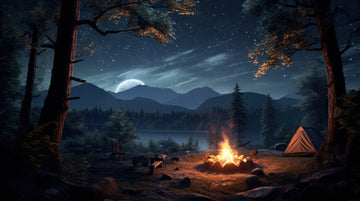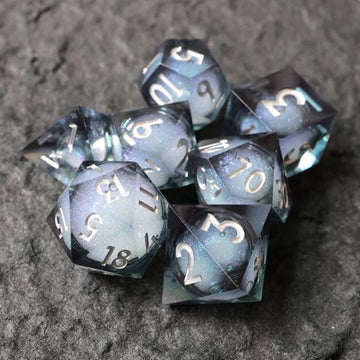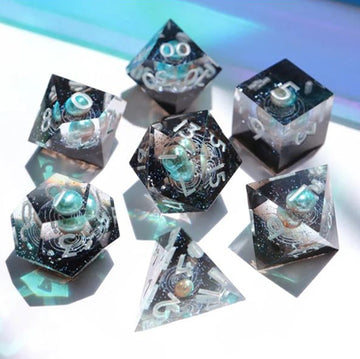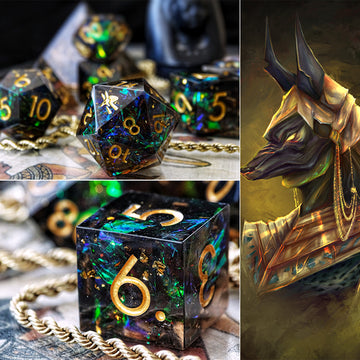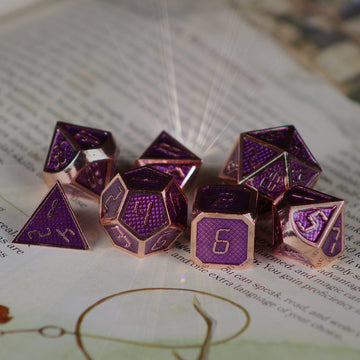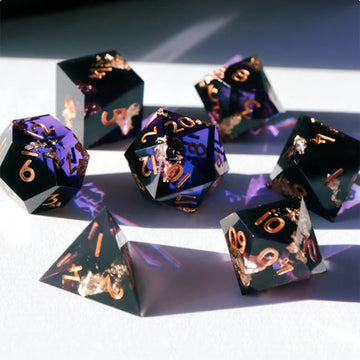How to Roleplay a DnD Campsite Encounter in 3 Steps
I've written about A) why travel is good (but sucks), B) overland travel methods, C) the best travel rules for dnd 5e, and D) DnD fast travel. But recently I realized that I skipped over perhaps the ONE THING that all those different types of travel have in common.
Because unless the party is being chased... or have some magic that prevents them from needing to find provisions... one way or another and sooner or later... your players will stop and make camp.
I skipped the "dnd campsite" making part.
I noticed this during my home campaign; session after session my players have wandered through a dangerous forest, but since I had no mechanism for meaningfully making camp, I just had them narrate their camp making activities. And that got old FAST.
Granted, I have written a post for Arcane Eye about making the most of your long rests... but I have found it wasn't specific enough for my DnD campsite needs.
This blog post offers three "stages" of any "making camp" encounter:
- Stage 1: Skill checks and mechanics for actually making the dnd campsite.
- Stage 2: Direction for role playing moments among the player characters around the campfire.
- Stage 3: Tips for making the dreaded "night watches" full of suspense and excitement.
Click the links above to jump to the section of your choice, or simply read on!

© Martin Hogue
Stage 1: Mechanics for Setting Up a DnD Campsite
So this is kind of the easy part... because the rules have already been written!
No, not by Wizards of the Coast... lol, are you kidding me? No, no, no.
Redditor "Dreadful_Aardvark" created some awesome basic mechanics to determine A) if players successfully set up their DnD campsite and B) what kind of rest they get (click here to open them up in a new window).
Here is a summary of how his DnD campsite mechanics work:
- Depending on the environment (ranging from a cozy inn to the Far Realm), the adventuring party makes a group check to determine if they can successfully make camp.
- Each player then takes that collective failure/success and adds it with anything that applies specifically to their character on a long checklist.
- The resulting positive or negative "camping score" determines what kind of rest their individual character is able to get that night.
Here is an example of the mechanics:
- The party is traveling through a desert looking for an oasis, but unfortunately night falls and they need to make camp.
- Because the desert is untamed wilderness, the DC for the group check is 15.
- The party collectively succeeds, giving each a +2 to their individual score...
- But a sandstorm blows through the night ("Extreme Weather," -2).
- Furthermore, one player had fallen to 0 hit points ("Defeated," -2) earlier that day in battle with a fire salamander.
- Thus, while most of the party has a camping score of 0 (-2 + 2 = 0) and gains the benefit of a long rest, the one player that dropped to 0 HP earlier that day has a camping score of -2 (-2 - 2 + 2 = -2) and only gains the benefits of a short rest that night.
My only change: allow players personalized skill checks to start.
Rather than having all the players roll a survival group check, I would allow players to choose which skills they want to use, just like they would in a regular skill challenge.
Of course, they COULD just roll survival. But given the checklist, they might be looking for specific things (like a cave or a hidden location) that could be better served by specific checks. Here are some ideas I came up with:
- Nature: find natural shelter or a location near running water and away from toxic plants.
- Survival: scavenging or hunting for food (amazing resource here), maintaining a fire, etc.
- Medicine: tending to wounds, identifying poisons, creating herbal remedies, and overcoming illness.
- Performance: raising morale.
- Acrobatics: climbing trees, setting up camp in trees.
- Deception: cover tracks, disguise fire, camouflage your site.
These skills are centered around the key factors anyone faces when trying to survive in the wilderness: shelter, clean water, food, warmth, and hope/sanity. If any more come to your or your players minds, by all means!
But apart from these skills, I love Dreadful_Aardvark's mechanics! Additional minor tweaks would including raising the DC for the environment, or adding additional factors for spell conditions, exhaustion, and sanity. But otherwise, two thumbs up!

© LeraStyajkina for Klondike Adventures
Role Playing Around the Fire at the DnD Campsite
I have a soft spot in my heart for campfires. My favorite summer high school involved a lot of fishing at the reservoir (though I'm not sure I have fished since!) followed by fire-pits at night with my friends. To this day, I tell people: "You go find the most meathead football player, put him with some good dudes around a fire-fit and give him a cigar, and he'll start opening up about his insecurities within an hour."
Something about staring into the flames sparks reflection, vulnerability, and conversation. And I have no reason to think otherwise for adventures in a fantasy setting! Once the DnD campsite is established, there simply isn't much else for Dungeons and Dragons characters to do.
They sit around the campfire and just... be.
All they have is whatever they are carrying and each other, which makes the campfire at a dnd campsite the PERFECT place to bring characters to life and strengthen bonds between the party. Apart from the tavern, which is usually a bit rowdier... or chatting as they walk on the open road... this is the only opportunity characters have to share their backstories and relax.
"Telecanter's Receding Rules" shared the same sentiment in a blog post. He explains that it's a shame that the rest at the campsite is often treated as nothing more than a spellcaster recharging station. He states: "I want campsites to be more than that. To me, they are the extension of the hearth into the wilderness and only if they feel that way, a bit safe, a bit like what we've left behind, will attacks in the night be jarring." His solution to encourage more intentional player campfire activity is as simple as it gets:
Every good thing they do around the campfire, they get an additional +1 temporary HP per class level.
- Cook a hearty, warm meal instead of resorting to rations? That's extra temp HP.
- Play a board game while smoking a pipe? That's extra temp HP.
- A character sings a song? That's extra temp HP.
If a player takes time to tell a story from their character's backstory, he ups the ante, giving them +2 to a save in the location the story took place, or an inspiration die to another player that comforts them as they remember their tragedy. And if they stare at the starry night sky, he considers giving them a free "Augury" spells.
Is it airtight or perfectly balanced? No... but it's a GREAT start. And any DM worth their salt will have no trouble improvising rewards that fit their campaign.
And it's wonderfully cinematic! Picture your halfling rogue, who's great with a frying pan, making tasty mushroom and wild herb omelets. Or think of your dwarf paladin teaching a game to his rogue friend who IMMEDIATELY attempts to cheat. Or the druid enlightening attentive companions on the unity of stars and trees...
Pause your campaign... slow down the pacing... and allow your players time to share stories, perspectives, etc. around the campfire. You might be amazed at how much it adds to your characters and campaign!

© Ylum
The Dreaded Night Watch...
But the campfire isn't where a DnD campsite encounter ends... in fact, you could say it is where the encounter BEGINS. Because as the fire fades and one by one the characters go to bed, it's time for the night watch. And more often than not, when only one or two weary adventurers are trying to stay awake and alert for threats is when the threats appear...
What makes a good night watch "scene"?
SUSPENSE. A player character is vulnerable, being the only defense between a peaceful night's sleep and a TPK. They don't know what is out there... could be nothing but it also could be ANYTHING. It's the perfect setting for players to express their agency.
The Internal State of the Player Character
In order to make the night watch exciting, you first have to establish the state of the character on watch. I imagine that any hero on guard duty at a DnD campsite would be feeling any number of the following things:
- Cold: Exposure to lower temperatures brings out irritable and melancholic moods.
- Lonely: A night watch involves limited interaction, amplifying feelings of loneliness.
- Scared: People fear the unknown, and the darkness hides much...
- Bored: Long periods of inactivity leads to boredom and restlessness.
- Paranoid: The combination of darkness, silence, and responsibility for safety can create a sense of hypervigilance, something bordering on paranoia.
- Sleepy: The human body is naturally inclined to rest at night, so fighting off drowsiness is a universal challenge of night guards.
- Prone to Overthinking: Long, quiet hours with little distraction often lead to introspection or rumination, sometimes amplifying personal concerns or fears.
- Heightened Awareness of Sounds: The quiet of the night amplifies even the smallest noises, making them seem ominous or significant. Guards often find themselves straining to identify whether a creak or a rustle is a threat or just nature.
- Loss of Time Perception: The monotony of the night can warp the sense of time, making hours feel like an eternity or blending together.
- Connection to the Universe: Sometimes, being alone under the stars or moonlight can evoke a sense of wonder, smallness, or spiritual connection, contrasting with the more negative feelings.
You can ask the players what their character is feeling during their watch, or have them roll a d10. Depending on the result, ask them why their character feels that way, or have them role play with the result in mind as they hear a rustling in the bushes...
6 Additional Tips when Making Camp in Dungeons and Dragons...
- You want to be really careful with surprise attacks at night... if you use any "coup de gras" rules (like the ones we mention here), it can easily result in a TPK that will not feel justified in the hearts and minds of your players.
- I tend to only have one player role-play their night's guard duty at a DnD campsite. Usually it's the one that gets the random encounter, but if there is no encounter, I'll still choose one.
- I would not allow players to get a long rest while wearing their weapons and armor. That stuff can be by their side, but not on their person.
- I would not have a high DC for staying awake. As this redditor states, he did hundreds of night watches in Afghanistan and never fell asleep once. If the adventurer is in a normal state, it should be pretty easy to stay awake.
- If the guard is suspicious of an attack, and they choose to wake up everyone in the party, I would NOT award them a long rest. They are not doing "light work," but immediately running on adrenaline, which in turn would make it hard to go back to sleep.
- If there is an attack, and whoever is on guard has to shout to wake everyone up, it should not be automatic. What I do is have players make a CON save, but they only wake up if they roll BELOW the DC! The idea is that heavier sleepers probably have good constitution.
"How Do I Set the Scene?"
- Step 1: Pick a player or randomly roll, even if there isn't an encounter that night.
- Step 2: Decide the player's temperament and emotional state.
- Step 3: Have the player roll a perception check.
- Step 4: Based on their roll, describe what they sense (sight, smell, hearing, taste, touch, "gut feeling").
- Step 5: Enjoy the encounter!
"Do You Have Any DnD Campsite Encounter Ideas?"
Yeah, try this ("20 random campsite encounters") or this ("100 long rest encounters"), or this ("50 overnight encounters").
About the Author
Riley is a freelance copywriter, content writer, and marketer based out of Spokane, WA. He is thankful to have the opportunity to combine his passion for imaginative role-playing to help FLGS, tabletop, board game, and D&D related businesses communicate their distinctive value to players everywhere. When not playing or writing about board games or DnD, he is busy hiking, cooking, and gardening... very hobbit-like for a 6'4" dude. Click here if you could use help with Board Game Marketing and Copywriting.

